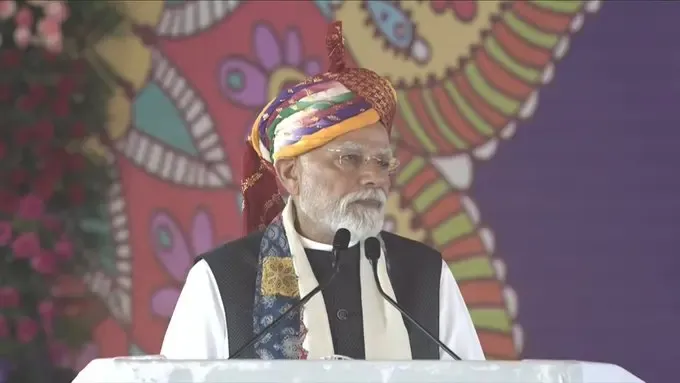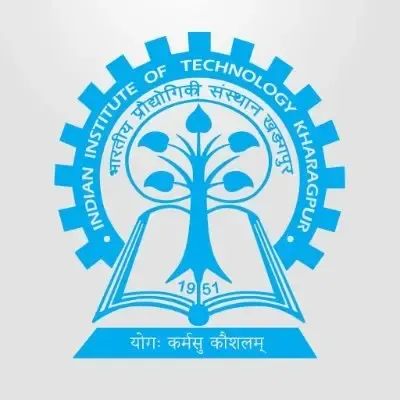Did PM Modi Inaugurate Power Projects Worth Rs 90,000 Crore in Rajasthan, MP, K'taka, Andhra, and Maharashtra?

Synopsis
Key Takeaways
- PM Modi inaugurated projects worth over Rs 1,22,100 crore.
- Focus on solar and nuclear energy in Rajasthan.
- New initiatives aim to empower tribal communities.
- Government emphasizes clean energy transition.
- Infrastructure development to enhance connectivity and growth.
Jaipur, Sep 25 (NationPress) Prime Minister Narendra Modi inaugurated and laid the groundwork for development initiatives exceeding Rs 1,22,100 crore in Banswara, Rajasthan on the fourth day of Navratri.
He expressed his honor to visit the revered land of Maa Tripura Sundari and Maa Mahi, emblematic of the strength and resilience of tribal communities.
Paying tribute to Maharana Pratap and Raja Bansia Bhil, the Prime Minister reflected on the inspiring leadership of Mahayogi Govind Guru Ji.
During this occasion, he announced several power projects totaling over Rs 90,000 crore across Rajasthan, Madhya Pradesh, Karnataka, Andhra Pradesh, and Maharashtra, describing the launch as a 'new chapter in India's energy landscape'.
In Rajasthan, the Prime Minister initiated solar, nuclear, and transmission projects, including the Mahi Banswara Atomic Power Project (valued at Rs 42,000 crore), one of India's largest nuclear facilities.
He also unveiled solar initiatives in Jaisalmer, Phalodi, Jalore, Sikar, and Bikaner, as well as transmission corridors under the Renewable Energy Zone (worth Rs 13,180 crore).
Highlighting that during Navratri, the nation venerates the nine forms of Goddess Shakti, the Prime Minister indicated that today's major event in Banswara is dedicated to 'Urja Shakti' -- energy generation.
He stated, 'A new chapter in India's power sector is being inscribed from the soil of Rajasthan,' emphasizing that the initiation of such extensive projects reflects India's rapid advancement in the energy sector, with every region playing a vital role.
The foundation stones for clean energy projects and transmission lines have been laid in Rajasthan.
Prime Minister Modi also inaugurated solar energy projects and announced the initiation of the Rajasthan Atomic Power Project in Banswara.
He stressed that from solar to nuclear energy, India is achieving new heights in power generation capacity.
He pointed out that in this era of technology and industry, development relies on electricity, which brings light, speed, progress, connectivity, and global accessibility.
Criticizing past administrations for underestimating the importance of electricity, he recounted that when his government assumed power in 2014, 2.5 crore households lacked electricity connections, and even after 70 years of independence, 18,000 villages had not seen a single electric pole.
He noted that major cities experienced prolonged power outages, while in villages, even four to five hours of electricity was deemed significant.
He remarked, 'The absence of electricity impeded factory operations and the establishment of new industries, affecting states like Rajasthan and the entire nation.'
The Prime Minister assured that in 2014, his administration resolved to transform this scenario.
He confirmed that electricity was supplied to every village nationwide, and 2.5 crore households received free electricity connections.
Wherever power lines reached, electricity followed, thus improving lives and facilitating the growth of new industries.
He asserted that for any nation to achieve rapid progress in the 21st century, it must enhance its electricity generation.
He emphasized that the most successful countries will lead in clean energy.
'Our government is turning the clean energy mission into a people's movement,' PM Modi announced, unveiling the PM Surya Ghar Muft Bijli Yojana, which installs solar panels on rooftops in urban and rural areas across the nation.
'To ensure affordable electricity for farmers, the PM-KUSUM scheme is facilitating the installation of solar pumps in agricultural fields.'
'India is advancing rapidly towards becoming a developed nation, with Rajasthan playing a crucial role in this journey,' PM Modi proclaimed.
He announced additional projects worth Rs 30,000 crore for Rajasthan, aimed at enhancing access to water, electricity, and healthcare.
The Prime Minister launched three new trains, including a Vande Bharat service.
He highlighted a nationwide initiative to create new job opportunities, under which 15,000 youth in Rajasthan received appointment letters for government positions on Thursday.
Expressing contentment that their government in Rajasthan works with full integrity towards the state's development, the Prime Minister remarked that the wounds inflicted on Rajasthan by prior administrations through misgovernance and exploitation are now being healed by the current BJP government.
Prime Minister Modi accused the opposition of turning Rajasthan into a hub for paper leaks and compromising the Jal Jeevan Mission through corruption.
He noted that the incidence of violence against women had surged in Rajasthan, with protection extended to offenders.
He highlighted that during the Congress era, areas like Banswara, Dungarpur, and Pratapgarh saw a spike in crime and illegal liquor trading.
The Prime Minister stated that once they were given a chance, law and order was reinforced, and development accelerated.
He mentioned that significant projects are now underway, with a growing network of highways and expressways across Rajasthan.
He affirmed that the BJP government is propelling Rajasthan, particularly south Rajasthan, onto a rapid development trajectory.
He emphasized that it is the BJP government that prioritized tribal welfare by creating a dedicated Ministry; for the first time under former Prime Minister late Atal Bihari Vajpayee, a separate Ministry for Tribal Affairs was established.
The Prime Minister noted that during Congress's governance, it was unimaginable for such large-scale projects to reach tribal regions.
He confirmed that under the present BJP government, these advancements are now becoming a reality.
He pointed out that through the efforts of the BJP, the daughter of a poor tribal family, Droupadi Murmu, has become the country's President, who herself raised the issue of the most marginalized tribal communities, inspiring the launch of the PM Janman Yojana.
'This initiative prioritizes the most deprived segments within tribal society,' the Prime Minister stated.
He highlighted that through the Dharti Aaba Janjatiya Gram Utkarsh Abhiyan, tribal villages are being modernized, benefiting over five crore tribal citizens.
He added that numerous Eklavya Model Residential Schools are being established nationwide.
He confirmed that the BJP government has also acknowledged the rights of forest dwellers and Scheduled Tribes.
'India's tribal communities have sustainably utilized forest resources for millennia,' PM Modi noted.
'To ensure these resources become a means of progress for them, the Union government initiated the Van Dhan Yojana.
He mentioned that the Minimum Support Price (MSP) for forest produce has been increased, and tribal products have been linked to market access.
As a result, he noted, India has experienced record growth in forest produce throughout the country.
Prime Minister Modi stated that the implementation of GST in 2017 liberated the nation from a convoluted network of taxes and tolls.
He pointed out that on the first day of Navratri this year, significant GST reforms were introduced, leading to the celebration of the 'GST Savings Festival' nationwide.
He emphasized that household kitchen expenditures have substantially decreased, providing direct relief to mothers and sisters across the country.
Prime Minister Modi urged that we should not lose sight of the goal of 'Aatmanirbhar Bharat' (self-reliant India).
He added that the mantra of 'Swadeshi' must not be forgotten and urged that what we sell should be swadeshi, and what we purchase must also be swadeshi.
He remarked that when individuals buy swadeshi products, the money remains within the country -- benefitting local artisans, workers, and traders.
'This money directly contributes to national development rather than flowing abroad, assisting in the construction of new highways and roads.'
He called upon everyone to make Swadeshi a representation of national pride.
The Prime Minister invited citizens to commit to purchasing only swadeshi goods during the festive period and reiterated his congratulations on the launch of development and employment-related initiatives.
The event was attended by notable figures such as Rajasthan Governor Haribhau Bagde, Chief Minister Bhajan Lal Sharma, and Union Minister Pralhad Joshi among other dignitaries.









